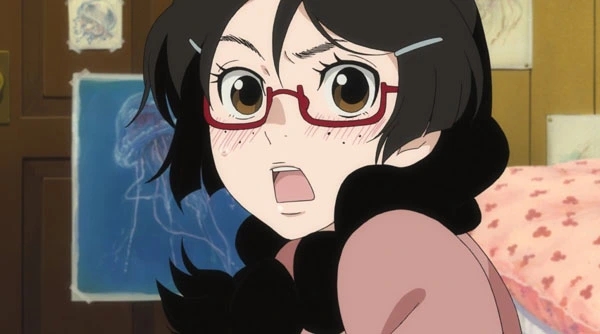May 26, 2023
·
0 comments
By Andrew Osmond.
Princess Jellyfish is an unusual name, which fits a most unusual anime. This eleven-part series is a sitcom that might turn into a romcom, in which the two main characters are a painfully shy girl with a passion for jellyfish, and a stunning princess who happens to be a boy (and the world’s most fashionable cross-dresser). Stir in a community of otaku girls, some political farce involving a man-eating seductress, the heroine’s yearnings for her lost mum, and a great deal of sewing. The result is a character-led comedy to rank beside Tokyo Godfathers, The Case of Hana and Alice and Maison Ikkoku.
The heroine is Tsukimi, who’s recently moved to central Tokyo and is thoroughly intimidated by the crowds of horribly fashionable, confident people. (The show’s set around Shibuya and Harajuku, which comprise the “worst” of Tokyo from that point of view.) Luckily, Tsukimi has a refuge, a communal building shared with other otaku women. It’s a vision of otaku-dom at its broadest, where the females are into trains, or traditional dolls, or the beauty of older men. The noisiest member of the household is a fanatic about Ancient Chinese history, specifically the period of the Three Kingdoms. Tsukimi’s love of jellyfish is bound up with her childhood and her mother, and her memories of both are the series’ sweetest strand.
It’s a jellyfish that brings Tsukimi together with the cross-dressing princess. Tsukimi is aghast to see a shop has carelessly and fatally put two different kinds of jellyfish together in one tank. That’s enough to override the girl’s shyness; think of it as a positive triggering. While Tsukimi is scuffling desperately with the shopkeeper, a stranger appears; a stunning, statuesque model, straight off a magazine cover. It’s the kind of person that Tsukimi would usually run to avoid, but the newcomer helps her save the stricken jellyfish before escorting her home. It’s only then that Tsukimi realises this princess is a he…
So starts an escalating comedy of errors and deceptions, of accidents and shocks. Never has an orgasmic nosebleed been funnier, or a walk in the rain more desolate (accompanied by one of the show’s key lines, “I want to be a jellyfish.”) This is very much its own show; however, if you’ve seen last year’s My Dress-Up Darling, Princess Jellyfish has some of that show’s sweetness (the dolls and sewing overlap, too). To add to the fun, the show has its own running cartoon gags. Tsukimi and her fellow housemates frequently turn into statues when they’re forced outside their comfort zones, while Tsukimi’s jellyfish often becomes a fourth-wall-breaking cartoon host, a la Maromi in Paranoia Agent.
Broadcast in 2010, Princess Jellyfish has a stellar pedigree. It was based on a manga by Akiko Higashimura, published in the women’s magazine Kiss. The anime version was helmed by Takahiro Omori, no stranger to formula-breaking comedies – he’d previously directed Baccano! and Durarara!! at the Brain’s Base studio, which also made Princess Jellyfish. The anime’s lead writer was Jukki Hanada, whose other credits range from Steins;Gate to Sound! Euphonium. Tsukimi is voiced in Japanese by Kana Hanazawa, who you’ll know as Mayuri from Steins;Gate, Shiemi in Blue Exorcist and Akane in Psycho-Pass. In the dub, Tsukimi is played by Maxey Whitehead, best known as Al in Fullmetal Alchemist: Brotherhood.
It’s an utterly delightful series, though some online descriptions might lead you to expect a different anime from what it actually is. Firstly, while Tsukimi’s housemates are great fun, it’s not primarily a women’s friendship show, as it focuses more on Tsukimi’s relationship with her princess (named Kurako or Kuranosuke). If you want a great women’s friendship anime where men are a distant second, I’d direct you to the film Looking for Magical Doremi.
Second, the series presents Kurako (or Kuranosuke) as a cishet boy, who loves cross-dressing for aesthetic rather than dysphoric reasons. The script pretty much rules out reading Kurako as trans, though he’s still a ringing endorsement of gender non-conformity, out and proud.
Andrew Osmond is the author of 100 Animated Feature Films. Princess Jellyfish is available to preorder from Anime Limited.
